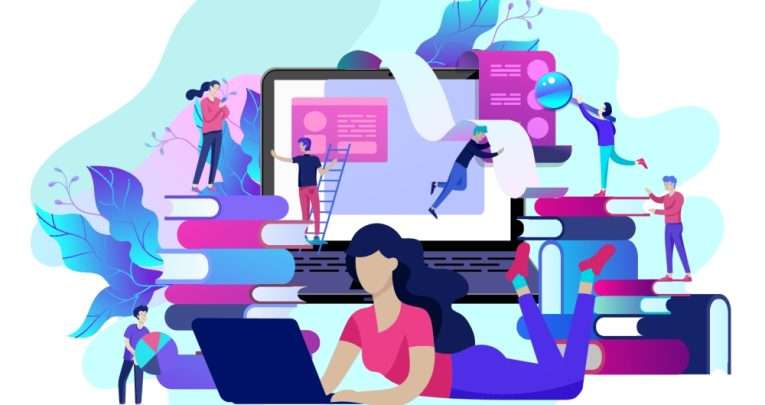“Fate has played her hand and forced us to embrace digital learning”

Christine Thomas considers whether the world-changing disruption we’ve seen this year will forever change how digital learning is used across English and other subjects

Never before has the lead-up to the GCSE examinations – or rather teacher assessments, given recent events – been so fraught.
Up to now, we have had a linear system where everything relies on maximising performance during the summer examinations. Following the introduction of enforced social distancing, however, traditional methods of teaching have had to be suspended, with the result that new forms of long- distance learning have needed to be swiftly incorporated to ensure that all students get the very best support at this crucial time.
The solutions to which many have turned have largely been technological. Schools and teachers have found themselves having to address a whole host of issues – a key one of which is how students can be supported in maintaining their interest and motivation to study, and how our current Y10s can be helped to prepare for their GCSEs.
Longer term, could the way in which schools have adapted to this unprecedented uncertainty bring about a different, uniquely sustainable form of independence for our students? A new paradigm in which they’re better equipped to revise for themselves and develop their own ways of learning? If implemented well, digital technology could well help make this a reality.
Students love technology
Many of us will have frequently bemoaned the smartphones that have become almost permanently attached to teenagers’ hands in the last few years, not to mention the headphones constantly attached to their ears – yet it’s entirely possible to channel teens’ love of technology into a positive force for good.
Mobile technologies, and social media in particular, have received a fair amount of bad press, but at times like this they can provide young people with an emotional and educational lifeline. There are digital products on the market that can provide an outlet for learning that goes far beyond the classroom, allowing young people to approach and develop their own studies in their own time, and at their own pace.
This, after all, is what will be expected of them in the workplace, so it ought to be encouraged. Through technology, students can establish their own groups of learners, share ideas among themselves and instil positive learning attitudes in each other as part of belonging to a wider digital community.
Revising Successfully
The key to successful subject revision has traditionally been to identify what you don’t know and concentrate on that. If students are able to develop a greater level of independence for themselves, they will be able to more effectively identify what it is they need to work on and take ownership over what it is they want to study.
After marking a cohort’s mocks and completing their assessments, teachers will usually be able to recognise any patterns of underachievement. Personalised targets can be noted down, and students directed to ensure that any gaps in their study are filled.
Teachers might opt to set remote learning tasks that involve the use of short videos. For their part, the students can use their phones to access the learning that’s been provided for them – which in today’s wired-up world, can often be far more straightforward than setting paper-based tasks.
Developing at their own pace
Most young people love watching short videos, which is where the digital publisher GCSEPod can help. Its unique Pods in English Literature, for example, provide students with an approachable and meaningful way of focusing on characters, themes and plot. They’re a perfect way of reminding students about key elements of texts, either through teachers setting tasks with clear direction, or by having students identify where they believe their own personal weaknesses to be and focusing on those areas that they know they need to work on.
Learning through technology allows students to revisit specific digital sources time and time again, giving them the opportunity to learn and digest information at a pace that’s comfortable for them. Some students may need only one attempt at doing this, others may need 10 – but when each video is only a few minutes long, it can be a worthwhile use of time to ensure that there’s a thorough understanding of a text.
Fate and the digital world
Additional features like Check and Challenge enable students to adopt an efficient quiz-like approach to learning with instant feedback – a great feature that rewards them for getting answers right, and which can provide them with instant reminders of what they need to know if their answers are incorrect.
As the current situation continues to unfold, what are we likely to learn from the experience of enforced social distancing conducted at scale? It may be that we can eventually come to harness strategies derived from what students have found to be the more positive aspects of their isolation. We’re presently seeing just how effective the digital world can be in supporting students to learn independently. As serious as the times undoubtedly are, this also presents us with an opportunity to see what works.
Fate has played her hand and forced us to embrace a world of digital learning, faster and more completely than any of us might have wished. Yet by embracing the opportunities this technology affords, the profession can use it to both address the problems we’re experiencing in the here and now, and perhaps pave the way for new and uniquely engaging approaches to teaching in future.
Christine Thomas has 25 years’ experience as an English teacher, school leader and consultant across the primary and secondary phases; she also sits on the management committee of the National Association of Teachers of English as regional activities officer
“My bounty is as boundless as the sea”
With pods covering many of the most popular texts for drama and prose, students can revise everything they need to know in short, engaging bursts. GCSEPod’s new Romeo and Juliet pods are some of its most absorbing yet. The content has recently been completely refreshed and revamped to cover context, plot, language, structure and a wide range of characters and themes. The style is rich and evocative, the characters detailed and expressive, the backgrounds colourful and theatrical, and the scripts engaging and entertainingly written (by a Chief Examiner!).
Students can access the pods anywhere, from any device, making them perfect for independent learning. For more information, visit gcsepod.com or follow @TheEdtechImpact











